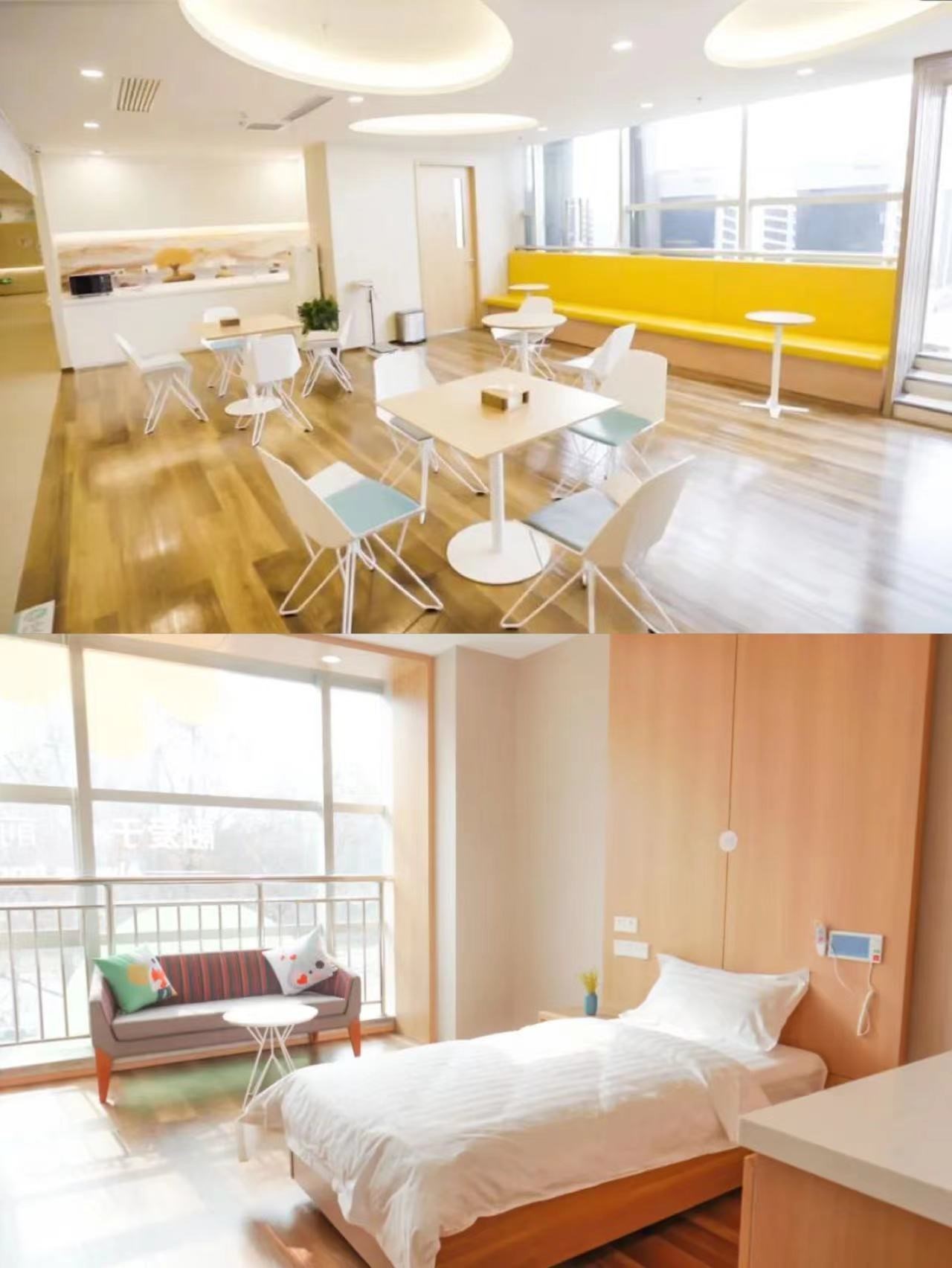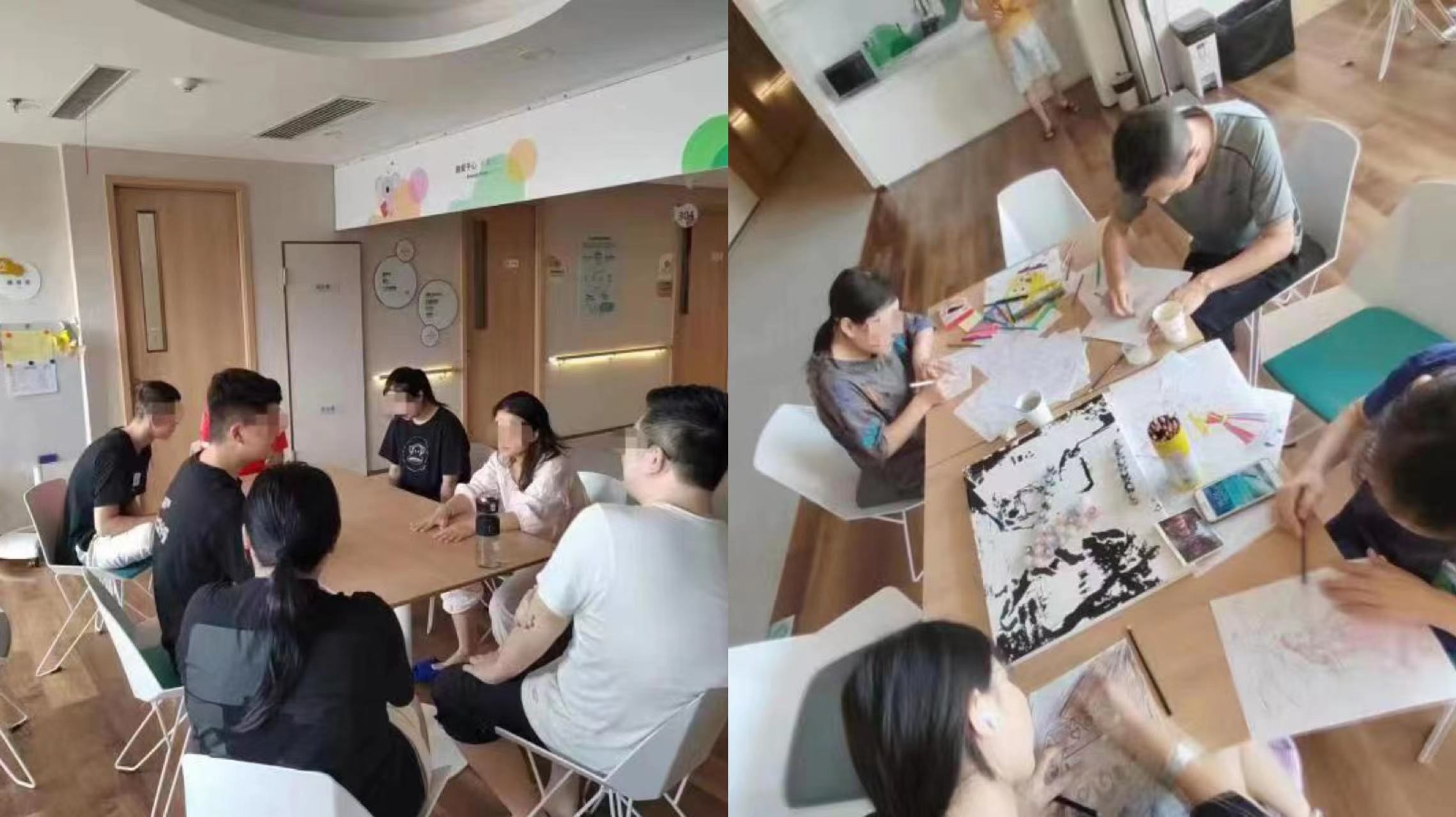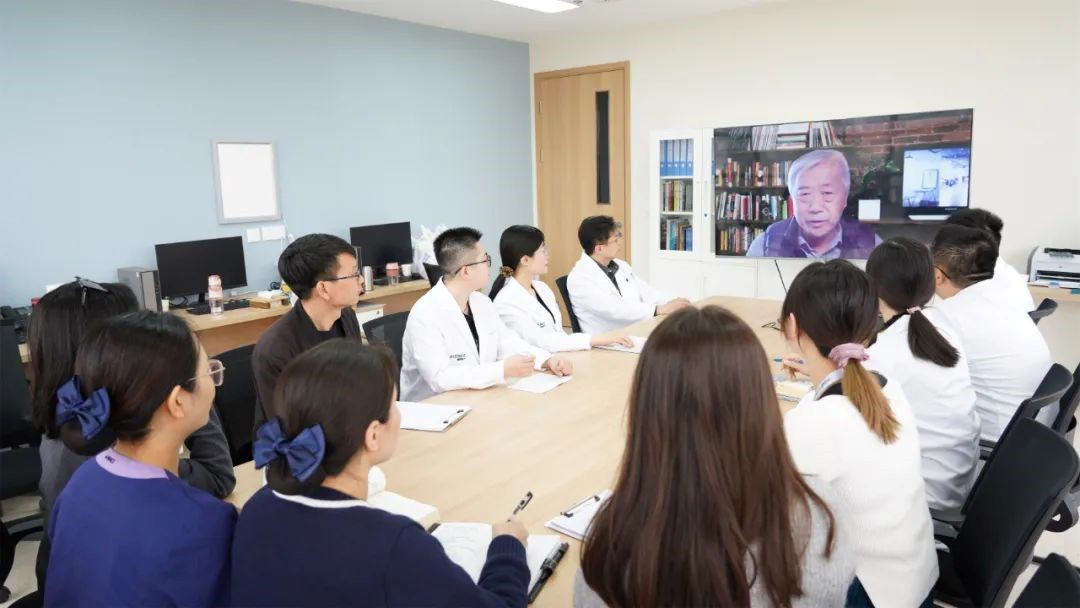
Scan the QR
to read the magazine on mobile phone
Editor’s note:
Xi’an Mindfront Hospital is the first high-end, international standard mental health hospital operated by Mindfront Health (China). The hospital has an excellent nursing team, they use their professional nursing knowledge as well as their warm, loving and tolerant hearts to care for patients, listen to their hearts and soothe their pain, providing strong support for the treatment of patients. This month we have the pleasure of inviting some representatives from the nursing team to hear about their stories at the hospital.

From left to right: Zhang Lihan, Zhou Li, Nursing Manager Ding Liying, Nursing Supervisor Li Huanhuan, Yang Yang
Q: Welcome and thanks for taking your time to do this interview, to start with, please give us a brief introduction of yourself.
Ding: My name is Ding Liying and I am the Nursing Manager. We currently have a team of 13 people including technicians. I have been working in the psychosomatic department of a general hospital for the past 20 years.
Li: My name is Li Huanhuan. I have 13 years of experience in nursing, I’m the nursing supervisor of Xi’an Mindfront Hospital.
Yang: I’m Yang Yang. I have 10 years of experience in nursing. It is my great pleasure to work in Mindfront with all these excellent team members.
Zhou: My name is Zhou Li and I have been working in nursing for 10 years, previously in the critical care unit of a general hospital. This is my first time working in psychiatric nursing.
Zhang: My name is Zhang Lihan. I’m a newly graduate, Mindfront is my first job after graduation, and I have been working in here for 1 year.
Q: Why did you choose to work in nursing at the very beginning?
Li: I think that when you are 17 or 18 years old, you do not know what you will do when you enter the medical profession. After working for more than 10 years, you will gradually experience a sense of achievement in it because you can help many people and this will gradually make you feel confident. In my daily life, I am happy to be able to help my loved ones who call me for advice when they are ill.
Yang: Nurse is a sacred job to me, I have always aspired to be a nurse since I was a child. This profession requires us to treat each patient with more patience, love, tolerance and understanding, which is in line with my personality.
Q: Can you walk through with us a day working in the hospital?
Li: Sure, first thing to do in the morning is to hand over to the next shift, let them know patients’ conditions in the last night. Then doctors will brief with nurses on patients. After that, nurses will take their patients to do some checkups. The nursing team also works with the psychologist to assist patients with psychotherapy and group therapy, monitor their medication, understand their daily status and organize their daily treatment. In the evenings we assist patients with washing up and if they are unstable, such as having difficulty sleeping, we talk to the doctor to help them sleep quietly and ensure that their condition progresses steadily.
Q: From your introductions, we know that some of you have many years of experience in the nursing profession and have previously worked in general hospitals. What are the differences in psychiatric care compared to care in general hospitals?
Zhou: I used to work in the south and because of the nature of the department I worked in, the overall work pace was a bit faster. After coming to Mindfront, I feel that the pace of work has slowed down and I need to be more patient. In the past, nurses always talked more and patients talk less. After coming here, I feel that we need to leave more opportunities for patients to talk, we need to listen to them and empathise with them. We provide better personalised support to patients as they progress from the acute to the recovery phase. I remember one patient once saying how much he liked the environment, it felt like an open school, it was a warm and safe environment for them to stay in and it helped to improve the patients' trust in us.

Dining area and ward of Xi’an Mindfront Hospital
Ding: Before joining Mindfront I worked in a general hospital psychosomatic department and one of the things that struck me most about working in this specialty was the changing perception of mental health. People have lots of misunderstandings when they know that I work in this specialty. However, as society develops, the importance of mental health is gradually increasing and many people are taking the initiative to learn about these illnesses and are more open to discussing them. For example, doctors from other departments will ask a psychosomatic doctor to participate in a consultation with a patient with emotional problems and offer to talk to them about the patient's situation.
Q: Could you please share with us some impressive patient stories at Mindfront?
Zhou: One of my patients is an old lady with some background diseases. She was admitted to our hospital for anxiety issues. We were able to determine that she did not have any organic lesions, but she continued to suffer from headaches and was worried about the side effects of the medication. Because I have some background knowledge in traditional Chinese medicine, so I gave her head massage for several times and foot bath every day before bedtime, and after a while her headache was relieved without medication. It's a small thing, but I'm happy to be able to use what I've learned to help patients and get their approval.
Zhang: I was impressed by a 16-year-old patient who had been diagnosed with bipolar disorder. This was a very sensitive child and I learned during my sessions that she had some unpleasant childhood experiences, and pressure from her family, which had led to her being emotionally unstable. After a month of physiotherapy and medication, she smiles more and is willing to communicate with other patients. She cried when she was about to be discharged from the hospital because she thought she might not meet anyone as nice as us in the future. We gave her a lot of encouragement and told her that now that her condition had improved so much, it was time for her to find the courage to step out of the hospital and gradually regain her social functions and learn to accept more possibilities for the future. When she was discharged the next day, she left me a note saying how grateful she was for all the help she had received during this time, how warm she had never felt in over ten years, and she was now better and had the courage to face her future life. This is one of the most impressive patient stories I have had since I joined Mindfront.

Patients taking therapies at the hospital
Q: How do you work together as a nursing team to help each other grow in your daily work?
Li: When our nursing team was first established, all but a few of our members had experience in the relevant field, and the rest had to undergo systematic theoretical training. From July last year to February this year, we have been conducting theoretical training, including hospital rules and regulations, case studies on diseases, emergency plans, emergency drugs, etc. But putting theory into practice is another challenge. The process of starting from scratch is always difficult, and we find problems, summarize them and correct them through regular meetings, sometimes even until 10 o'clock at night, but in this way we have gradually rationalized all the processes and have now worked out a path that suits us. When it comes to working together, I think it's a great team, we're always helping each other out, correcting problems as soon as we can, trying to mitigate risks and making sure the team runs smoothly.
Q: What do you see in your colleagues that you can learn from?
Zhang: Ding has a lot of experience working in the psychosomatic department and I can learn a lot from her. She is like an encyclopedia; I can find the answer to many questions that I don't know. When I encounter difficulties in my work, my colleagues are always there to help me.
Zhou: I can see good things from every colleague, for example Ding, her first impression to me is very inclusive, very active to lead me to the field of mental health, through systematic and complete training, now I am self-confident, in the work can also be handy, all thanks to the help of Ding and Huan.
Ding: I’m grateful to hear everyone’s recognition, and I will stay true to my heart and lead the team to forge ahead. I think all my colleagues are excellent. Huan is perfect as a nursing supervisor. Zhou Li has experience in Grade A Class 3 hospital, she is excellent and always eager to learn. She is a faster learner and willing to help other colleagues using what she has learned, which is a strong support to Huan and my work. Lihan doesn’t have much experiences and he has some flaws at work, but he can always make improvement with our guidance and he is a good team player. Yang Yang was not familiar with some of the procedures when she first joined the hospital, but after a period of time, she was able to complete each shift smoothly and with high quality.
Yang: My first impression about Ding is friendly, and after a period of time, I can feel she is an inclusive and warm-hearted leader. Huan works with us every day, she is attentive to details and is able to think from other’s perspectives. Zhou Li is eager to learn and willing to share with us about what she has learned. Lihan is very active, he is also one of the most popular nurses among patients.
Q: I can feel this is a friendly and united team after hearing your sharing, any teamwork stories that you can share with us?
Zhou: One thing that really impressed me was the cleaning and moving work before hospital operation. We had to move all kinds of furniture and materials from the first floor to the fourth floor. We all worked hard hoping to get the hospital open as soon as possible, and it took less than a day to complete the work that was planned to take several days.
Q: Finally, please share your thoughts on what you have learned since joining the Xi'an Mindfront Hospital and your expectation for the future.
Ding: I feel more relaxed and emotionally stable since joining Mindfront and I am lucky to have such a great group of people to work with. The hospital leadership team and other departments have been very supportive and cooperative, including the administration, operations, psychology team, medical team and pharmacy department. With the increasing emphasis on mental health issues in society, I believe that the private sector like Mindfront will have a better future and I hope that more people will join our team in the future.
Zhou: The most rewarding aspect of this job is that it has benefited my life, and I saw some adolescent patients during work, which has given me a deep insight into the importance of parent-child relationships and family relationships for the healthy development of children. In the past, I would have waited until my children reached adolescence to think about these issues, but now I realize the importance of children's mental health in their early years, which is a valuable insight for me. When it comes to the future development of the hospital, I believe that if the hospital is well developed, individuals will be well developed and I will continue to keep my original heart and grow with the hospital.
Li: One of the things I've learned since joining Mindfront is that our leadership team is always at the forefront, leading by example and providing the utmost care to our patients.
I have grown a lot since I joined the team, as I have moved from being a nurse to a new position as a nursing supervisor, which has changed the way I look at things. I used to look at things from my own point of view, but now I have to learn to look at the bigger picture. Secondly, the way we work has improved me. When I used to work in a Class 3 hospital, nurses didn't really have the opportunity to get to know the patients' backgrounds in depth, but here we discuss and dig deeper into the patients' conditions with colleagues from all departments, and this has helped me to understand that there is a process for patients to get to this point. I am fortunate to work in a team that is open and gives me access to a variety of learning opportunities such as MDT meetings and parenting classes. As a mother, I am able to use these learning opportunities to further my knowledge of parent-child relationships and apply it to my children's education.

MDT meeting with experts
Yang: When I worked in the psychiatric department of a general hospital, I can always feel the tension and had to watch out for any unexpected behavior of the patients, but I don't feel that way at Mindfront.
Zhang: I have come into contact with some adolescent patients at work and their experiences have given me a lot of insight. Although I am only 23 and not yet married, I feel that I need to pay attention to the education and mental health growth of my children in the future. I used to be a bit impatient, but due to my work environment, I feel I am now more peaceful.
Q: Thank you all for this month's interview, you have all shared so much and it was great to get to know such a loving and warm team through your stories.

